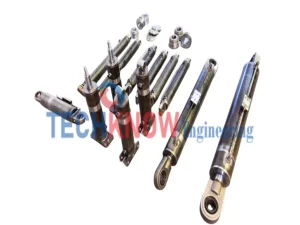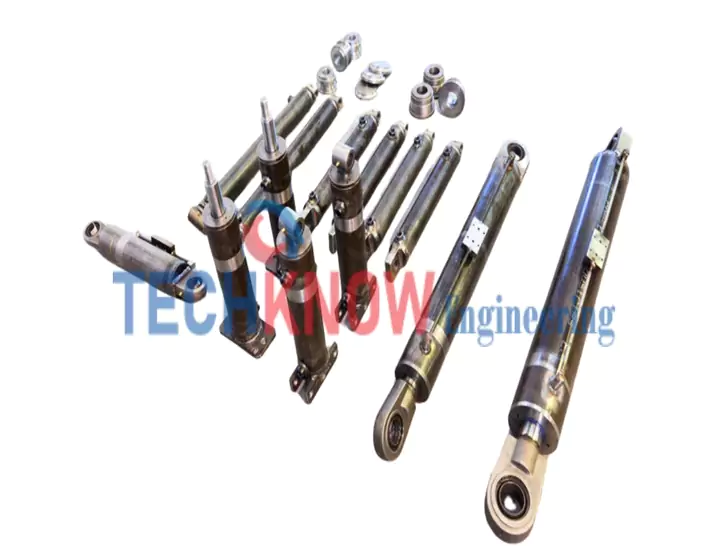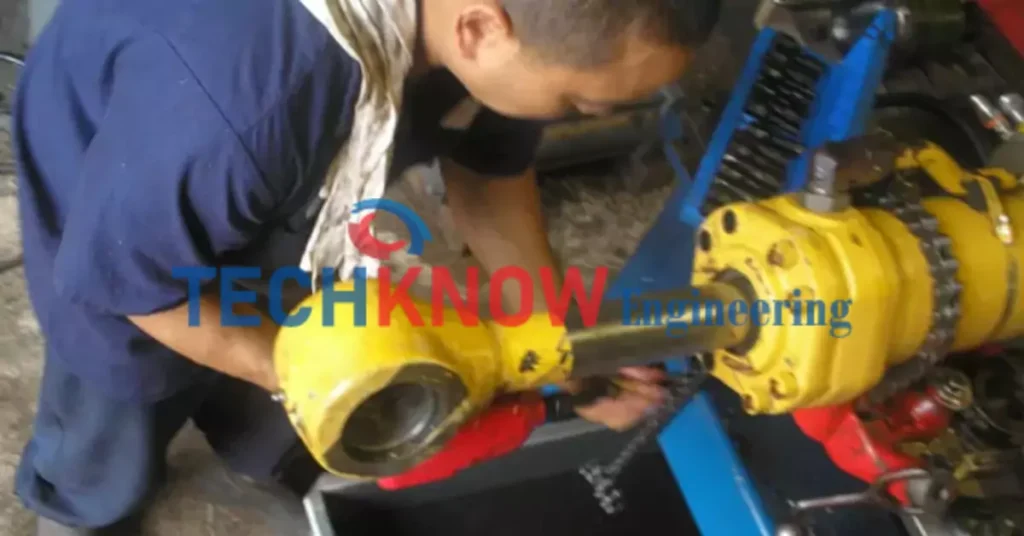Understanding Hydraulic Cylinders
Hydraulic Cylinders play a pivotal role in modern machinery, providing the muscle behind many mechanisms that power industries around the globe. But what exactly are hydraulic cylinders, and why are they indispensable in so many applications?
At Techknow Engineering Enterprise, we specialize in delivering high-performance hydraulic solutions designed to meet the rigorous demands of construction, manufacturing, agriculture, and beyond. With years of engineering expertise and a commitment to quality, we understand the essential role hydraulic cylinders play in driving productivity and reliability.
you’ll gain a clearer understanding of how hydraulic cylinders work, explore the various types available, and discover why proper maintenance is key to keeping them running smoothly. Whether you’re managing heavy-duty equipment or overseeing automated systems, this guide will equip you with everything you need to know about hydraulic cylinders.
How Hydraulic Cylinders Work
At their core, hydraulic cylinders are mechanical actuators that convert hydraulic energy into linear motion. They are powered by pressurized fluid, typically oil, which is forced into the cylinder through a system of valves. The hydraulic pressure acts on a piston, generating a controlled, linear force that moves machinery or equipment.
This fluid-driven mechanism operates on Pascal’s Law, which states that “pressure applied to a confined fluid is transmitted equally in all directions.” Essentially, small amounts of hydraulic fluid can produce substantial force with precision, making hydraulic cylinders incredibly effective and versatile.
Key Components of Hydraulic Cylinders
To better understand their operation, here’s a breakdown of the primary parts of a hydraulic cylinder:
- Cylinder Barrel: The main body that holds the pressurized fluid.
- Piston and Rod: The piston divides the barrel into two chambers, while the rod transfers the force generated by hydraulic pressure to the machinery.
- Seals: Prevent fluid leakage and maintain consistent pressure levels.
- End-Cap and Mounting Head: Secure the cylinder and provide points for attachment to the machinery.
Types of Hydraulic Cylinders
While all hydraulic cylinders share the same fundamental purpose, their design can vary depending on the application. Here are the most common types:
- Single-Acting Cylinders: These cylinders have hydraulic fluid act on only one side of the piston. They produce force in one direction, while an external force or spring returns the piston to its original position. They’re widely used in applications like jacks and presses.
- Double-Acting Cylinders: Double-acting cylinders use hydraulic fluid on both sides of the piston, enabling motion in both directions. This makes them ideal for applications requiring precise control or repeated motion, like forklifts and excavators.
- Telescopic Cylinders: These multi-stage cylinders feature nested tubes that extend like a telescope, providing extra-long stroke capability in a compact design. Telescopic cylinders are common in dump trucks and other applications needing extensive reach.
- Tie-Rod Cylinders: Reinforced with tie rods for added strength, these are popular for industrial uses, such as manufacturing equipment or assembly lines.
- Welded Body Cylinders: These cylinders have a sealed construction that makes them durable and compact. They’re excellent for demanding applications like construction or heavy equipment.
Applications of Hydraulic Cylinders
Hydraulic cylinders are indispensable across a wide range of industries, thanks to their ability to produce immense force reliably. Let’s explore a few notable fields where they shine:
- Construction: From bulldozers to cranes, hydraulic cylinders are key to powering heavy machinery that moves earth, lifts materials, and more.
- Agriculture: Hydraulic cylinders help operate farm equipment like tractors, harvesters, and plows, ensuring efficiency in food production.
- Manufacturing: Industrial presses, injection molding machines, and conveyor systems rely on hydraulic cylinders to maintain precision and high productivity.
- Transportation: You’ll find hydraulic cylinders at work in dump trucks, buses, and even aircraft for tasks like braking systems and controlled lifts.
- Mining: Heavy-duty capabilities make hydraulic cylinders vital for operating massive machinery like excavators and drills in harsh mining environments.
No matter the application, the versatility of hydraulic cylinders proves their importance in driving efficiency and productivity across industries.
Advantages and Disadvantages of Hydraulic Cylinders
Advantages
- High Force Output: Hydraulic cylinders generate powerful linear force, perfect for heavy-duty tasks.
- Compact Design: Their ability to produce large amounts of force in relatively small spaces is a critical advantage in machinery with size constraints.
- Precise Control: Hydraulic systems allow for smooth, precise motion and adjustment.
- Durability and Reliability: High-quality hydraulic cylinders, such as those from brands like HYDAC, are designed to handle extreme conditions with minimal wear.
Disadvantages
- Maintenance Requirements: Without proper upkeep, hydraulic seals can wear down, leading to leaks and reduced performance.
- Initial Cost: Hydraulic systems can be expensive to install compared to simpler mechanical alternatives.
- Sensitivity to Contamination: Hydraulics require clean fluid. Contaminated fluid can damage components or reduce efficiency.
Maintenance Tips for Longevity
To ensure your hydraulic cylinders run smoothly and efficiently for years to come, follow these maintenance tips:
- Regular Inspections: Check for leaks, scratches on the piston rod, or worn seals. Addressing minor issues early prevents major damage later.
- Proper Lubrication: Ensure that your hydraulic fluid is clean and at the appropriate levels. Dirty or low fluid reduces performance and could damage the system.
- Protect the Rod: Shield the piston rod from impact or environmental contaminants like dirt and water to maintain its integrity.
- Follow Manufacturer Guidelines: Stick to maintenance schedules and recommendations outlined by trusted brands like HYDAC.
By investing in routine care, you’ll maximize performance and save costs in the long run.
Why Hydraulic Cylinders Matter
Hydraulic cylinders remain one of the most reliable technologies for powering machinery across multiple industries. Their ability to harness hydraulic force for precise, efficient motion makes them indispensable for modern operations. Key players in the market, like authorized HYDAC distributors, ensure access to high-quality, long-lasting equipment tailored to meet industrial needs.
If you’re operating machinery that depends on hydraulic systems, understanding their types, benefits, and proper maintenance can help you unlock their full potential. Invest in reputable brands, commit to regular upkeep, and watch your productivity soar.
Hydraulic Cylinders

Hydraulic cylinders are key components in various industries, transforming fluid power into mechanical motion. Used in construction, manufacturing, and agriculture, they power heavy machinery efficiently. Understanding their mechanisms, types, and maintenance ensures durability, peak performance, and maximum productivity.
Product Brand: Techknow Engineering Enterprise
Product Currency: INR
Product In-Stock: InStock
5


